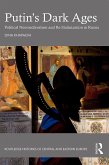Wim Blockmans, Daniel SchläppiPolitical Cultures and the Emergence of the State in Europe 1300-1900
Empowering Interactions (eBook, PDF)
Political Cultures and the Emergence of the State in Europe 1300-1900
Redaktion: Holenstein, André
44,95 €
44,95 €
inkl. MwSt.
Sofort per Download lieferbar

22 °P sammeln
44,95 €
Als Download kaufen

44,95 €
inkl. MwSt.
Sofort per Download lieferbar

22 °P sammeln
Jetzt verschenken
Alle Infos zum eBook verschenken
44,95 €
inkl. MwSt.
Sofort per Download lieferbar
Alle Infos zum eBook verschenken

22 °P sammeln
Wim Blockmans, Daniel SchläppiPolitical Cultures and the Emergence of the State in Europe 1300-1900
Empowering Interactions (eBook, PDF)
Political Cultures and the Emergence of the State in Europe 1300-1900
Redaktion: Holenstein, André
- Format: PDF
- Merkliste
- Auf die Merkliste
- Bewerten Bewerten
- Teilen
- Produkt teilen
- Produkterinnerung
- Produkterinnerung

Bitte loggen Sie sich zunächst in Ihr Kundenkonto ein oder registrieren Sie sich bei
bücher.de, um das eBook-Abo tolino select nutzen zu können.
Hier können Sie sich einloggen
Hier können Sie sich einloggen
Sie sind bereits eingeloggt. Klicken Sie auf 2. tolino select Abo, um fortzufahren.

Bitte loggen Sie sich zunächst in Ihr Kundenkonto ein oder registrieren Sie sich bei bücher.de, um das eBook-Abo tolino select nutzen zu können.
This volume explores the emergence of the state in Europe between the fourteenth and nineteenth centuries. Through a series of case studies and historiographical, methodological and theoretical essays, it challenges the traditional top-down model of state development long held by historians. Instead it explores the numerous ways in which non-elite groups could influence the formation of national political institutions
- Geräte: PC
- mit Kopierschutz
- eBook Hilfe
- Größe: 6.35MB
Andere Kunden interessierten sich auch für
![The Political Thought of Thomas Spence (eBook, PDF) The Political Thought of Thomas Spence (eBook, PDF)]() Matilde CazzolaThe Political Thought of Thomas Spence (eBook, PDF)42,95 €
Matilde CazzolaThe Political Thought of Thomas Spence (eBook, PDF)42,95 €![Dictators and Autocrats (eBook, PDF) Dictators and Autocrats (eBook, PDF)]() Dictators and Autocrats (eBook, PDF)0,00 €
Dictators and Autocrats (eBook, PDF)0,00 €![France and Fascism (eBook, PDF) France and Fascism (eBook, PDF)]() Brian JenkinsFrance and Fascism (eBook, PDF)56,95 €
Brian JenkinsFrance and Fascism (eBook, PDF)56,95 €![History, Ethics, and the Recognition of the Other (eBook, PDF) History, Ethics, and the Recognition of the Other (eBook, PDF)]() Anton FroeymanHistory, Ethics, and the Recognition of the Other (eBook, PDF)46,95 €
Anton FroeymanHistory, Ethics, and the Recognition of the Other (eBook, PDF)46,95 €![Britain and Disarmament (eBook, PDF) Britain and Disarmament (eBook, PDF)]() John R. WalkerBritain and Disarmament (eBook, PDF)48,95 €
John R. WalkerBritain and Disarmament (eBook, PDF)48,95 €![The Longman Companion to European Nationalism 1789-1920 (eBook, PDF) The Longman Companion to European Nationalism 1789-1920 (eBook, PDF)]() Raymond PearsonThe Longman Companion to European Nationalism 1789-1920 (eBook, PDF)54,95 €
Raymond PearsonThe Longman Companion to European Nationalism 1789-1920 (eBook, PDF)54,95 €![Putin's Dark Ages (eBook, PDF) Putin's Dark Ages (eBook, PDF)]() Dina KhapaevaPutin's Dark Ages (eBook, PDF)31,95 €
Dina KhapaevaPutin's Dark Ages (eBook, PDF)31,95 €-
-
-
This volume explores the emergence of the state in Europe between the fourteenth and nineteenth centuries. Through a series of case studies and historiographical, methodological and theoretical essays, it challenges the traditional top-down model of state development long held by historians. Instead it explores the numerous ways in which non-elite groups could influence the formation of national political institutions
Dieser Download kann aus rechtlichen Gründen nur mit Rechnungsadresse in A, B, BG, CY, CZ, D, DK, EW, E, FIN, F, GR, HR, H, IRL, I, LT, L, LR, M, NL, PL, P, R, S, SLO, SK ausgeliefert werden.
Produktdetails
- Produktdetails
- Verlag: Taylor & Francis eBooks
- Seitenzahl: 372
- Erscheinungstermin: 2. März 2017
- Englisch
- ISBN-13: 9781317144229
- Artikelnr.: 47903586
- Verlag: Taylor & Francis eBooks
- Seitenzahl: 372
- Erscheinungstermin: 2. März 2017
- Englisch
- ISBN-13: 9781317144229
- Artikelnr.: 47903586
- Herstellerkennzeichnung Die Herstellerinformationen sind derzeit nicht verfügbar.
Professor Dr Wim Blockmans, now retired from the University of Leiden, The Netherlands, Professor Dr André Holenstein, University of Berne, Switzerland and Professor Dr Jon Mathieu, University of Lucerne, Switzerland, Mr Daniel Schlÿppi, University of Berne, Switzerland.
Introduction: Empowering Interactions: Looking at Statebuilding from Below,
André Holenstein; Part I Southern Europe; Chapter 1 The Construction of
Local Political Identity in Lake and River Communities in North-West Italy,
Twelfth to Fourteenth Centuries, Roberto Leggero; Chapter 2 Models of
Government 'from Below' in Fifteenth-Century Lombardy. The 'Capitoli di
Dedizione' to Francesco Sforza, 1447-1450, Giorgio Chittolini; Chapter 3
Models of Government 'from Below' in Fifteenth-Century Lombardy. The
'Capitoli di Dedizione' to Francesco Sforza, 1447-1450, Bertrand Forclaz;
Chapter 4 The Politics of Mercy: Village Petitions and a Noblewoman's
Justice in the Roman Countryside in the Eighteenth Century, Caroline
Castiglione; Chapter 5 The Dynamics of Law Formation in Italian Legal
Science during the Early Modern Period: the Function of Custom, Roy Garré;
Part II Central and Eastern Europe; Chapter 6 Threats from Above on Request
from Below: Dynamics of the Territorial Administration of Berne, 1420-1450,
Simon Teuscher; Chapter 7 Modes of Reading, Community Practice and the
Constitution of Textual Authority in the Thurgau and Graubünden, 1520-1660,
Randolph C. Head; Chapter 8 'God is high up, the Tsar is far away'. The
Nature of Polity and Political Culture in Seventeenth-Century Russia. A
Comparative View, Endre Sashalmi; Chapter 9 Communication between
Authorities and Subjects in Bohemia, Hungary and the Holy German Empire,
1650-1800: A Comparison of Three Case Studies, Stefan Brakensiek; Chapter
10 Corporate Property, Collective Resources and Statebuilding in Older
Swiss History, Daniel Schläppi; Chapter 11 Local Demand for Order and
Government Intervention: Social Group Conflicts as Statebuilding Factors in
Villages of the Rhine Palatinate, c.1760-1810, Niels Grüne; Chapter 12
Joseph-Samuel Farinet and the 'Modern' State: Banditry, Patronage and
Resistance in Nineteenth-Century Valais, Sandro Guzzi-Heeb; Part III
Northern and Western Europe - and Beyond; Chapter 13 Political Topos or
Community Principle? Res Publica as a Source of Legitimacy in the French
Peasants' Revolts of the Late Middle Ages, Vincent Challet; Chapter 14
Statebuilding in Portugal during the Middle Ages: A Royal Endeavour in
Partnership with the Local Powers?, Adelaide Millán da Costa; Chapter 15
Informing the Council. Central Institutions and Local Knowledge in the
Spanish Empire, Arndt Brendecke; Chapter 16 Peasants and Tax-farmers in
Seventeenth- Century Sweden: Local Conflict and Institutional Change, Mats
Hallenberg; Chapter 17 Statebuilding with the Participation of the Estates?
East Frisia between Territorial Legislation and Communalist Ritual,
1611-1744, Reemda Tieben; Part IV Historiographical and Conceptual Debates;
Chapter 18 Citizens and their Rulers, Wim Blockmans; Chapter 19 Concepts
and Approaches in Recent Scholarship on Statebuilding - A Critical Review,
Peter Blickle; Chapter 20 No Statebuilding from Below! A Critical
Commentary, Wolfgang Reinhard; Chapter 21 Statebuilding from Below -
Towards a Balanced View, Jon Mathieu; Chapter 22 The Impact of
Communication Theory on the Analysis of the Early Modern Statebuilding
Processes, Barbara Stollberg-Rilinger; Chapter 23 Empowering Interactions
and Intertwining Jurisdictions, Angelo Torre;
André Holenstein; Part I Southern Europe; Chapter 1 The Construction of
Local Political Identity in Lake and River Communities in North-West Italy,
Twelfth to Fourteenth Centuries, Roberto Leggero; Chapter 2 Models of
Government 'from Below' in Fifteenth-Century Lombardy. The 'Capitoli di
Dedizione' to Francesco Sforza, 1447-1450, Giorgio Chittolini; Chapter 3
Models of Government 'from Below' in Fifteenth-Century Lombardy. The
'Capitoli di Dedizione' to Francesco Sforza, 1447-1450, Bertrand Forclaz;
Chapter 4 The Politics of Mercy: Village Petitions and a Noblewoman's
Justice in the Roman Countryside in the Eighteenth Century, Caroline
Castiglione; Chapter 5 The Dynamics of Law Formation in Italian Legal
Science during the Early Modern Period: the Function of Custom, Roy Garré;
Part II Central and Eastern Europe; Chapter 6 Threats from Above on Request
from Below: Dynamics of the Territorial Administration of Berne, 1420-1450,
Simon Teuscher; Chapter 7 Modes of Reading, Community Practice and the
Constitution of Textual Authority in the Thurgau and Graubünden, 1520-1660,
Randolph C. Head; Chapter 8 'God is high up, the Tsar is far away'. The
Nature of Polity and Political Culture in Seventeenth-Century Russia. A
Comparative View, Endre Sashalmi; Chapter 9 Communication between
Authorities and Subjects in Bohemia, Hungary and the Holy German Empire,
1650-1800: A Comparison of Three Case Studies, Stefan Brakensiek; Chapter
10 Corporate Property, Collective Resources and Statebuilding in Older
Swiss History, Daniel Schläppi; Chapter 11 Local Demand for Order and
Government Intervention: Social Group Conflicts as Statebuilding Factors in
Villages of the Rhine Palatinate, c.1760-1810, Niels Grüne; Chapter 12
Joseph-Samuel Farinet and the 'Modern' State: Banditry, Patronage and
Resistance in Nineteenth-Century Valais, Sandro Guzzi-Heeb; Part III
Northern and Western Europe - and Beyond; Chapter 13 Political Topos or
Community Principle? Res Publica as a Source of Legitimacy in the French
Peasants' Revolts of the Late Middle Ages, Vincent Challet; Chapter 14
Statebuilding in Portugal during the Middle Ages: A Royal Endeavour in
Partnership with the Local Powers?, Adelaide Millán da Costa; Chapter 15
Informing the Council. Central Institutions and Local Knowledge in the
Spanish Empire, Arndt Brendecke; Chapter 16 Peasants and Tax-farmers in
Seventeenth- Century Sweden: Local Conflict and Institutional Change, Mats
Hallenberg; Chapter 17 Statebuilding with the Participation of the Estates?
East Frisia between Territorial Legislation and Communalist Ritual,
1611-1744, Reemda Tieben; Part IV Historiographical and Conceptual Debates;
Chapter 18 Citizens and their Rulers, Wim Blockmans; Chapter 19 Concepts
and Approaches in Recent Scholarship on Statebuilding - A Critical Review,
Peter Blickle; Chapter 20 No Statebuilding from Below! A Critical
Commentary, Wolfgang Reinhard; Chapter 21 Statebuilding from Below -
Towards a Balanced View, Jon Mathieu; Chapter 22 The Impact of
Communication Theory on the Analysis of the Early Modern Statebuilding
Processes, Barbara Stollberg-Rilinger; Chapter 23 Empowering Interactions
and Intertwining Jurisdictions, Angelo Torre;
Introduction: Empowering Interactions: Looking at Statebuilding from Below,
André Holenstein; Part I Southern Europe; Chapter 1 The Construction of
Local Political Identity in Lake and River Communities in North-West Italy,
Twelfth to Fourteenth Centuries, Roberto Leggero; Chapter 2 Models of
Government 'from Below' in Fifteenth-Century Lombardy. The 'Capitoli di
Dedizione' to Francesco Sforza, 1447-1450, Giorgio Chittolini; Chapter 3
Models of Government 'from Below' in Fifteenth-Century Lombardy. The
'Capitoli di Dedizione' to Francesco Sforza, 1447-1450, Bertrand Forclaz;
Chapter 4 The Politics of Mercy: Village Petitions and a Noblewoman's
Justice in the Roman Countryside in the Eighteenth Century, Caroline
Castiglione; Chapter 5 The Dynamics of Law Formation in Italian Legal
Science during the Early Modern Period: the Function of Custom, Roy Garré;
Part II Central and Eastern Europe; Chapter 6 Threats from Above on Request
from Below: Dynamics of the Territorial Administration of Berne, 1420-1450,
Simon Teuscher; Chapter 7 Modes of Reading, Community Practice and the
Constitution of Textual Authority in the Thurgau and Graubünden, 1520-1660,
Randolph C. Head; Chapter 8 'God is high up, the Tsar is far away'. The
Nature of Polity and Political Culture in Seventeenth-Century Russia. A
Comparative View, Endre Sashalmi; Chapter 9 Communication between
Authorities and Subjects in Bohemia, Hungary and the Holy German Empire,
1650-1800: A Comparison of Three Case Studies, Stefan Brakensiek; Chapter
10 Corporate Property, Collective Resources and Statebuilding in Older
Swiss History, Daniel Schläppi; Chapter 11 Local Demand for Order and
Government Intervention: Social Group Conflicts as Statebuilding Factors in
Villages of the Rhine Palatinate, c.1760-1810, Niels Grüne; Chapter 12
Joseph-Samuel Farinet and the 'Modern' State: Banditry, Patronage and
Resistance in Nineteenth-Century Valais, Sandro Guzzi-Heeb; Part III
Northern and Western Europe - and Beyond; Chapter 13 Political Topos or
Community Principle? Res Publica as a Source of Legitimacy in the French
Peasants' Revolts of the Late Middle Ages, Vincent Challet; Chapter 14
Statebuilding in Portugal during the Middle Ages: A Royal Endeavour in
Partnership with the Local Powers?, Adelaide Millán da Costa; Chapter 15
Informing the Council. Central Institutions and Local Knowledge in the
Spanish Empire, Arndt Brendecke; Chapter 16 Peasants and Tax-farmers in
Seventeenth- Century Sweden: Local Conflict and Institutional Change, Mats
Hallenberg; Chapter 17 Statebuilding with the Participation of the Estates?
East Frisia between Territorial Legislation and Communalist Ritual,
1611-1744, Reemda Tieben; Part IV Historiographical and Conceptual Debates;
Chapter 18 Citizens and their Rulers, Wim Blockmans; Chapter 19 Concepts
and Approaches in Recent Scholarship on Statebuilding - A Critical Review,
Peter Blickle; Chapter 20 No Statebuilding from Below! A Critical
Commentary, Wolfgang Reinhard; Chapter 21 Statebuilding from Below -
Towards a Balanced View, Jon Mathieu; Chapter 22 The Impact of
Communication Theory on the Analysis of the Early Modern Statebuilding
Processes, Barbara Stollberg-Rilinger; Chapter 23 Empowering Interactions
and Intertwining Jurisdictions, Angelo Torre;
André Holenstein; Part I Southern Europe; Chapter 1 The Construction of
Local Political Identity in Lake and River Communities in North-West Italy,
Twelfth to Fourteenth Centuries, Roberto Leggero; Chapter 2 Models of
Government 'from Below' in Fifteenth-Century Lombardy. The 'Capitoli di
Dedizione' to Francesco Sforza, 1447-1450, Giorgio Chittolini; Chapter 3
Models of Government 'from Below' in Fifteenth-Century Lombardy. The
'Capitoli di Dedizione' to Francesco Sforza, 1447-1450, Bertrand Forclaz;
Chapter 4 The Politics of Mercy: Village Petitions and a Noblewoman's
Justice in the Roman Countryside in the Eighteenth Century, Caroline
Castiglione; Chapter 5 The Dynamics of Law Formation in Italian Legal
Science during the Early Modern Period: the Function of Custom, Roy Garré;
Part II Central and Eastern Europe; Chapter 6 Threats from Above on Request
from Below: Dynamics of the Territorial Administration of Berne, 1420-1450,
Simon Teuscher; Chapter 7 Modes of Reading, Community Practice and the
Constitution of Textual Authority in the Thurgau and Graubünden, 1520-1660,
Randolph C. Head; Chapter 8 'God is high up, the Tsar is far away'. The
Nature of Polity and Political Culture in Seventeenth-Century Russia. A
Comparative View, Endre Sashalmi; Chapter 9 Communication between
Authorities and Subjects in Bohemia, Hungary and the Holy German Empire,
1650-1800: A Comparison of Three Case Studies, Stefan Brakensiek; Chapter
10 Corporate Property, Collective Resources and Statebuilding in Older
Swiss History, Daniel Schläppi; Chapter 11 Local Demand for Order and
Government Intervention: Social Group Conflicts as Statebuilding Factors in
Villages of the Rhine Palatinate, c.1760-1810, Niels Grüne; Chapter 12
Joseph-Samuel Farinet and the 'Modern' State: Banditry, Patronage and
Resistance in Nineteenth-Century Valais, Sandro Guzzi-Heeb; Part III
Northern and Western Europe - and Beyond; Chapter 13 Political Topos or
Community Principle? Res Publica as a Source of Legitimacy in the French
Peasants' Revolts of the Late Middle Ages, Vincent Challet; Chapter 14
Statebuilding in Portugal during the Middle Ages: A Royal Endeavour in
Partnership with the Local Powers?, Adelaide Millán da Costa; Chapter 15
Informing the Council. Central Institutions and Local Knowledge in the
Spanish Empire, Arndt Brendecke; Chapter 16 Peasants and Tax-farmers in
Seventeenth- Century Sweden: Local Conflict and Institutional Change, Mats
Hallenberg; Chapter 17 Statebuilding with the Participation of the Estates?
East Frisia between Territorial Legislation and Communalist Ritual,
1611-1744, Reemda Tieben; Part IV Historiographical and Conceptual Debates;
Chapter 18 Citizens and their Rulers, Wim Blockmans; Chapter 19 Concepts
and Approaches in Recent Scholarship on Statebuilding - A Critical Review,
Peter Blickle; Chapter 20 No Statebuilding from Below! A Critical
Commentary, Wolfgang Reinhard; Chapter 21 Statebuilding from Below -
Towards a Balanced View, Jon Mathieu; Chapter 22 The Impact of
Communication Theory on the Analysis of the Early Modern Statebuilding
Processes, Barbara Stollberg-Rilinger; Chapter 23 Empowering Interactions
and Intertwining Jurisdictions, Angelo Torre;







